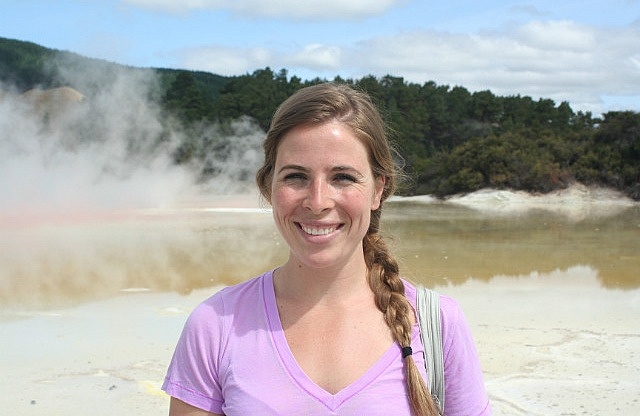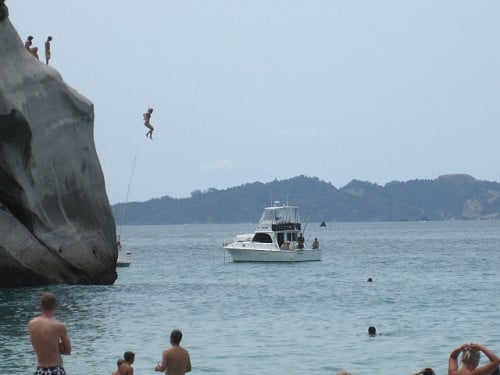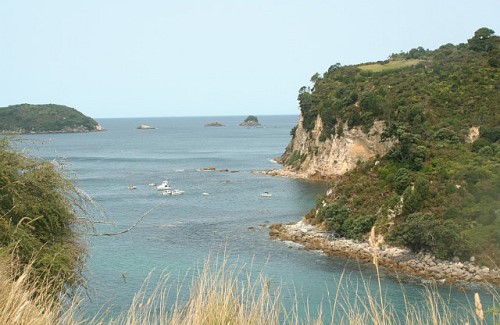
This blog was authored by former student Teddy Eisenhut and originally posted April 8, 2013.

The common perception of foreign study is total immersion into another culture to live and learn somewhere far from home. This is completely true. But the most beneficial aspect of the whole experience is not just the memories and life-changing experiences, but the lessons you take away from them.
Studying in New Zealand for the past six weeks has provided me with the opportunity and pleasure to get to know a few Kiwis (New Zealanders). In addition to their love of rugby and knack for creating adrenaline-releasing sports, I learned a few important lessons that I think are beneficial to someone who is looking ahead as a future attorney.
1. It’s not always better to be safe than sorry.
While visiting a town in the Coromandel Peninsula, I had the opportunity to try my hand at some cliff diving (or in my case jumping). I found myself at the top of the 30-foot plunge, with only a rope to abseil myself down to the jumping point. My strategy revolved around two possible endings to the whole situation. Either I was going to successfully propel myself down the rock wall or I was not. If the latter, I planned to keep up the forward momentum and jump off, hoping to not land on the rocks below. Thankfully, the ordeal ended in the former. Looking back, the whole situation was a little absurd and mostly dangerous, but it was one of the best experiences I’ve had on this trip. Looking ahead, I realized it’s sometimes important to take a leap, even if the landing is uncertain. The view is great from the top of the cliff, but the story isn’t half as great as it is from the water below.

2. Give without expectation of return.
One of the most moving aspects of Kiwi culture is the deep-rooted presence of this rule, a mantra often repeated yet rarely practiced in the U.S. Throughout our New Zealand experience, friends would pick us up, invite us into their homes for dinner or a swim, and even offer us places to stay on our travels. The gift that left the biggest impression on my mind, however, came from a Kiwi we met socializing on the beach one night. Being in a somewhat remote area and at a loss of what really to do there, we asked him where the best places were to visit. He offered to show us a number of places the next day. Holding true to his promise, he spent his entire day off showing complete strangers not only some beautiful tourist spots, but also some hidden secrets. In an economy where advancement, both monetarily and career-wise, is in the forefront of everyone’s mind, it becomes easy to forget the reward of helping someone “just because.” However, serving others is the core of the legal profession, and we, as future attorneys, make a commitment to put others’ needs before our own. In our careers, it is important to move forward, but it is as equally important to consider at what cost.
3. Take time to just think about things.
As Americans and especially as students, we have grown accustomed to the instant availability of information via the Internet. I never realized the degree of my attachment until I was deprived of late-night library hours and the cost of purchasing Internet by the gigabyte. One of the most important lessons I learned in New Zealand was the power of just thinking things through. As law students, we often jump right into research by firing up Westlaw and punching in keywords that somehow relate to a topic, hoping that one of them will come back with a winner. What we often skip over is the process of actually thinking a problem through, coming up with possible solutions, then looking for precedent to match the best ideas. This process not only saves a lot of time, but also helps to clarify and uncover weaknesses in an argument. We often forget that our most powerful asset is our mind and its ability to see outside the confines of drawn boundaries.
4. Make a point to learn someone’s story.
Perhaps a socially shy person like myself would rather meticulously map out an area before visiting than have to stop and ask for directions. Given the lack of Internet I mentioned earlier and the remoteness of New Zealand in general, you simply can’t do that. If anything has changed about myself in the past six weeks, it has been my ability to just talk to people. Inextricably attached to this ability is the ability to listen. Just listening to the stories of the people I met, I learned so much more about New Zealand than I ever could have learned visiting the many landmarks and museums. As students of the law, we are often two steps ahead of ourselves with an answer – not actually taking time to listen to a problem or the arguments against it. Unfortunately, this characteristic, though important in moderation, often causes us to miss information or fail to see the whole picture. Most importantly, it often makes us appear overbearing or uncompassionate. Choosing a field that essentially makes us problem-solvers, clients will come to us at some of the hardest moments in their life. Our inability to listen and communicate might not only lose a case, but also a client.
 5. Work hard and then watch the sunset off the end of your surf board.
5. Work hard and then watch the sunset off the end of your surf board.
Many Kiwis commuted to the town of Hamilton, the place we called our home for six weeks. Most of them came from a small surf town called Raglan located about forty minutes away. One of the biggest adjustments we, as American students, had to make was the fact that most stores adhered to a strict policy of closing at 5:00 p.m. We learned that this was to accommodate the value Kiwis put on a relaxing end to their day – mainly catching the evening surf swell. I believe there is a bigger lesson to take away from this, though. Kiwis are committed to the most important part of life – just living. The five o’clock rule isn’t so much about ending the workday as soon as possible; it is about enjoying the last bit of a long day with friends and family. Going into a profession that requires a considerable amount of our time and resources, it’s important to remember the importance of sometimes leaving work behind and enjoying the sunset or the company of friends over a few drinks and a nice meal.



